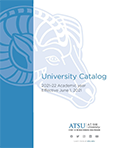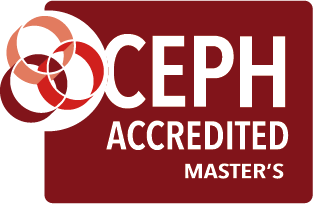Master of Public Health - Dental Emphasis with a
Dental Public Health Residency Certificate
A.T. Still University’s College of Graduate Health Studies sponsors a full-time, 25-month completely online residency program in Dental Public Health. This new residency program provides a formal training opportunity for dentists planning careers in dental public health. Because the program is fully online, it enables trainees to balance their professional and personal life with their education. During this program, residents learn about the fundamental principles of public health including epidemiology, biostatistics, healthcare policy and management, behavioral sciences, and environmental health with an emphasis on oral health and dentistry-related issues. They also receive training in the 10 dental public health competencies outlined by the American Board of Dental Public Health. In addition, the program provides residents with a field experience opportunity as well as instruction in essentials of scientific research.
Program graduates receive a Master of Public Health (dental emphasis) and a Dental Public Health Residency Certificate, and are qualified educationally to apply for examination by the American Board of Dental Public Health for specialty certification. Transfer credits are not accepted. All residents must earn their MPH with a dental emphasis from ATSU while in this 25 month residency.
The goal of the Dental Public Health Residency program is to provide dentists with training in the general public health as well as dental public health and prepare them to function as public health dentists whose activities are concerned with preventing and controlling dental diseases and promoting dental health through organized community efforts.
Program essentials
Master of Public Health - Dental Emphasis Degree Curriculum
Students in the Dental Public Health Residency Program complete the same core courses that appear under the Master of Public Health with dental emphasis curriculum section. In addition to those 13 core courses, Dental Public Health Residency students must also complete three research courses: Research II, Research III, and Research IV.
Career Advancement
According to the Bureau of Labor statistics, overall employment of public health professionals from 2019-29 is predicted to grow much faster than the average for all occupations.
- Dental director in a community health center
- Dental director for a local or state health department
- Dental manager in a professional dental organization
- Dental personnel in a federal health agency
- Dental faculty in dental or dental hygiene school
- Dental personnel for an insurance company
- Epidemiologist
- Manager in a community-based nonprofit
- Public health administrator
- Researcher
Requirements
- Bachelor’s degree or higher from an accredited university. Applicants who graduated from a university outside the United States must provide a degree equivalency evaluation.
- Completed admissions application.
- Official transcript from a qualifying degree-granting institution. For students using VA benefits transcripts for all institutions attended are required.
- Non-refundable application fee submitted with application.
- Minimum Cumulative Grade Point Average (CGPA) of 3.0 (4.0 scale) at the qualifying degree institution. Candidates with a GPA below 3.0 may apply by completing an additional essay during the application process to explain factors that precipitated a student’s low GPA and how and why a student will be successful in a program. Students who did not attend an institution where a GPA system was used are required to petition the program chair.
- National Boards Part I and II scores.
- A current resume.
- Completion of essay.
- Applicants are required to demonstrate proficiency in English when applying to the College of Graduate Health Studies, A.T. Still University. Written and spoken proficiency in the English language may be demonstrated by one of the following options:
- Option 1 - English is your first language.
- Option 2 - Graduated from a regionally accredited four year university or college in the United States (minimum BA or BS).
- Option 3 - You are demonstrating your English proficiency by submitting acceptable scores on the Test of English as a Foreign Language (TOEFL) or the International English Testing Service (IELTS).
Accepted test types for CGHS are:
- Internet based total score = 80
- Acceptable IELTS score are an overall band score of 6.5
The TOEFL is administered by TOEFL/TSE Services, P.O. Box 6151, Princeton, NJ, 08541-6151, USA, phone: 609. 771.7100. Information is available at http://www.ets.org/toefl. A.T. Still University’s institutional code is 0339. Please be sure to include this information when you submit your application packet. TOEFL Educational Testing Services P.O. Box 6151 Princeton, NJ 08541-6151, phone: 609.771.7100
- ATSU does not provide assistance in securing visas. All residents must possess a visa and must live in the U.S. during the length of residency.
- Applicants are selected by an admission committee.
-
Technology requirements: All ATSU students are required to own a computer system. Minimum system requirements vary depending on program.
Continuing Education
ATSU offers Continuing Education (CE) for MPH and MPH-D faculty, students, and public health workers in the community. If you are interested in continuing education please visit TRAIN.org.
TRAIN is a nationally developed system of CE programs developed by agencies of the federal government and various universities, and is the nation’s premier learning resource for professionals who protect the public’s health. TRAIN is comprised of the national www.train.org site and participating TRAIN affiliate sites. TRAIN users can access information about state, local, national, or international training available to them through any participating TRAIN site.
Students in the Dental Public Health Residency Program complete the same core courses that appear under the Master of Public Health with dental emphasis curriculum section. In addition to those 13 core courses, Dental Public Health Residency students must also complete three research courses: Research II, Research III, and Research IV.
Tuition
Review tuition and fees for Master of Public Health - Dental Emphasis with Dental Public Health Residency Certificate program. Please note tuition and fees are subject to change.
Jeff Chaffin, DDS, MPH, MBA, MHA, is an assistant professor in the Master of Public Health – Dental Emphasis program at A.T. Still University. Dr. Chaffin graduated from the University of Tampa in 1988, and received a doctor of dental surgery from the University of Nebraska in 1992, a master’s in public health from the University of Michigan in 2000, a master’s in business administration from the University of Texas at San Antonio in 2006, and a master’s in healthcare administration from Baylor University in 2006. Dr. Chaffin is a diplomate of the American Board of Dental Public Health, currently serves as the immediate past president of the American Board of Dental Public Health, a Fellow of the American College of Healthcare Executives, a Fellow of the International College of Dentistry, a member of the Official Order of Military Medical Merit (O2M3), and he holds the Surgeon General’s “A” designator for excellence in Dental Public Health.
Dr. Chaffin spent 21 years on active duty in the US Army serving as the chief of dental for TRICARE. His research interests focused on dental patient satisfaction and military dental readiness. Current research work is focused on dental sealants and factors associated with dental care utilization.
Jaana Gold, DDS, PhD, MPH, CPH, is a professor at A.T. Still University College of Graduate MPH program, and an adjunct clinical associate professor at the University of Florida College of Dentistry, in the Department of Community Dentistry and Behavioral Sciences. Dr. Gold received her DDS degree from the University of Oulu, Finland in 1992; a doctorate degree in preventive dentistry in 2005; and completed advanced education program in dental public health at NYU Langone Hospitals in NYU in 2019. She brings over 25 years of experience in teaching, research, and practice in dentistry.
Dr. Gold’s research interests include caries management and prevention, oral health promotion, dental education, and dental public health. She has published original research in peer-reviewed journals and presented in several international and national conferences. She is teaching dental epidemiology, evidence-based dentistry, dental research, global health issues, and dental public health, and she serves as an advisor for MPH students and dental public health residents. Dr. Gold is a member of several national and international professional organizations; serves in several national and institutional leadership roles and continue to conduct research and promote and advocate for oral health in underserved populations.

Chair and Professor
Mary-Katherine McNatt, DrPH, MPH, MCHES, CPH, COI, is department chair and associate professor of the Master of Public Health program at A.T. Still University-College of Graduate Health Studies.
Dr. McNatt holds a doctorate of public health with an emphasis in social and behavioral sciences from the University of North Texas Health Science Center in Fort Worth, a master’s in rural public health from Texas A&M University Health Science Center School of Rural Public Health, and a bachelor’s in biology from Texas A&M University with a minor in chemistry. She is a master certified health education specialist, is certified in public health, and is a certified online instructor.
Dr. McNatt has extensive experience in epidemiology, program planning, community health, and public health preparedness; with experience working in the non-profit sector, government sector as well as in academia. She has been teaching online since 2007, and has completed and obtained her online teaching certificate from Sloan-C, COI from LERN, and is currently taking courses from Quality Matters.
Prior to becoming a full time academic, Dr. McNatt was the first full time pandemic program planner in the state of Texas at Dallas County Health and Human Services. Key activities included enhancing existing surveillance systems for seasonal influenza, educating community leaders through created lectureships and programs, and provide consulting services for agencies in developing their own business continuity and continuity of operations plans. Prior to her employment for Dallas County she worked as a community health facilitator for Catholic Charities in the Diocese of Fort Worth, focusing on community health education and outreach.
Dr. McNatt has published multiple research articles on pandemic planning and emergency preparedness, and on social media in educating diverse populations; she also presents regularly at national conferences on rural border health issues, health equity, social media and water scarcity as a public health issue, this includes presentations at American Public Health Association and National Rural Health Association. She has served as a national spokesperson for the American Heart Association as well as former chairman of the American Heart Association Cultural Health Initiatives Tarrant County Task Force. She is a member of the National Rural Health Associations Government Advisory Council, National Rural Health Association’s Health Equity Board, and serves on the Association of Schools and Programs of Public Health Education Committee, Diversity and Inclusion Committee and Best Practices in Pedagogy subcommittee. She is also a CPH question writer.
Dr. McNatt’s research interests include cultural health disparities, rural /border health issues, maternal and child health, public health preparedness, and special medical needs populations.
In her spare time she enjoys riding horses and traveling. Dr. McNattlives in Texas with family.
Gregory Loeben, PhD, MA, is an associate professor and the MPH practicum coordinator in A.T. Still University’s College of Graduate Health Studies. Previously, Dr. Loeben served as an associate professor and coordinator of bioethics at Midwestern University in Glendale, Ariz., where he created and ran a master’s degree program in medical ethics. Prior to Midwestern, he was coordinator of the Outreach Program at the University of Pennsylvania Center for Bioethics. He received a bachelor’s in both philosophy and environmental studies from the University of Vermont, and a master’s and doctorate in philosophy from the University of Arizona.
Dr. Loeben has served as a consultant or advisor on medical ethics issues to numerous healthcare institutions. He is on the board of the Arizona Bioethics Network and serves as a consultant He has an extensive experience in clinical ethics consultations, working with healthcare ethics committees, and research institutional review boards. His current research interests include a variety of issues in public health ethics, clinical ethics consultation, and online ethics education. More specifically, Dr. Loeben is interested in how professional and conscience based refusals to participate in an apparent medical activity should be understood. He is also interested in developing tools to measure the effectiveness of animal therapy programs for special needs populations.
Marisa Hastie, EdD, MS, ACSM-EP, PN-1, FACSM is the Dean of the College of Graduate Health Studies at AT Still University. Dr. Hastie received her doctor of education from George Fox University (2013), her master of science in exercise and sport science with an emphasis in biomechanics from the University of Oregon (2003), and her bachelor of science in exercise science from Gonzaga University (2001). She is a fellow of the American College of Sports Medicine (ACSM) and is a certified Exercise Physiologist.
Prior to joining ATSU, she was a Professor of Exercise Science and Program Chair for the Exercise Science Program at Lasell University (Newton, MA). Dr. Hastie also served as the Faculty Fellow for the Fuss Center for Research on Intergenerational Education and Aging and received the deWitt Excellence in Educational Leadership Award from Lasell University. Dr. Hastie served as Faculty Chair of the University’s governance system.
Dr. Hastie has served in several leadership roles at the regional and national level of the ACSM, which include her current roles on the Professional Education Committee at the national level and as the President-Elect for the New England chapter. Her research interests have included exploring the connection between lifelong physical activity and long-term health outcomes, the relationship between exercise training and cognition, and the effects of discrimination experiences on health-related coping behaviors.
Dr. Hastie has extensive experience in online program development, teaching, and assessment. She developed an online Master of Science in Nutrition for Human Performance program and has 18 years of experience in both synchronous and asynchronous teaching formats. She became an educator because she strongly believes in the development of the whole student as a crucial responsibility of higher education institutions.
University Catalog

Review the University Catalog to learn more about the Master of Public Health - Dental Emphasis with a Dental Public Health Residency Certificate program catalog program. Read detailed course descriptions and obtain answers to many of your questions regarding application information and tuition.
Accreditation
A.T. Still University of Health Sciences is accredited by the Higher Learning Commission
230 S. LaSalle Street, Suite 7-500,
Chicago, IL 60604
Phone: 800.621.7440 | Fax: 312.263.7462
Email: info@hlcommission.org
The ATSU Residency in Dental Public Health is accredited by the Commission on Dental Accreditation and has been granted the accreditation status of approval without reporting requirements. The Commission is a specialized accrediting body recognized by the United States Department of Education. The Commission on Dental Accreditation can be contacted at (312) 440-4653 or at 211 East Chicago Avenue, Chicago, 1L 60611. The Commission’s web address is: http://www.ada.org/en/.

The Council on Education for Public Health (CEPH) has accredited the Master of Public Health - Dental Emphasis program at ATSU-CGHS for a seven-year term extending to July 1, 2028.
The Public Health Program at A.T. Still University College of Graduate Health Studies is undergoing the re-accreditation process with the Council on Education for Public Health (CEPH). The CEPH re-accreditation site review is scheduled for April 30 and May 1, 2028. As part of the accreditation process, CEPH encourages interested parties, including students, alumni, faculty and the practice community, to provide written input that will inform the deliberations of a site visit team. CEPH is accepting written comments about the public health program and its practices, procedures and policies until March 30, 2028.
You may send your written comments to CEPH at:
Zeinab Bazzi, MPH
Council on Education for Public Health
1010 Wayne Ave, Suite 220
Silver Spring, MD 20910
Or via email: zbazzi@ceph.org

The program in dental public health is accredited by the Commission on Dental Accreditation and has been granted the accreditation status of “approval without reporting requirements”. The Commission is a specialized accrediting body recognized by the United States Department of Education. The Commission on Dental Accreditation can be contacted at (312) 440-4653 or at 211 East Chicago Avenue, Chicago, IL 60611. The Commission’s web address is: https://coda.ada.org/. The Commission on Dental Accreditation has accredited the program in dental public health. However, accreditation of the program does not in itself constitute recognition of any dental specialty status.
Master of Public Health - Dental Emphasis Degree Faculty
The ATSU-College of Graduate Health Studies faculty and staff are dedicated to helping each student succeed along their Master of Public Health – Dental Emphasis career path. They comprise an elite team of leaders in their respective fields, with all faculty members holding doctorate degrees. The public health dental degree program offers an exclusive opportunity to learn from the finest educators in the public health field. All coursework is taught by industry leaders, academic innovators, and former top public servants. No teaching assistants are used in any of the courses. Faculty provides support to students in various ways. Communication with online public health degree students includes email, chat, forum postings, and phone. They serve as facilitators and mentors, helping students to meet course objectives, apply key concepts to real-world situations, and develop the skills needed for success in the healthcare industry. Additional support is provided to students through comprehensive student services such as advising and technical support.
Student Selection
The program is available to qualified graduates from a school of dentistry accredited by the Commission on Dental Accreditation of the American Dental Association or from a Canadian dental school with accreditation recognized by the commission. Graduates of schools from other countries must have passed NBDE Parts 1 & 2 and possess an equivalent educational background.
Application
Applications from prospective residents are accepted through the electronic application system (PASS), which is sponsored by the American Dental Education Association.
Applications are due November 1 of each year with the residency starting that following June. Documents required are outlined in the PASS application system. Applications received are reviewed by the residency director for completeness and compliance with educational requirements. If necessary, additional information is requested of applicants. Applications are further reviewed by the residency director and other members of the admission committee. They conduct personal interviews with eligible candidates by telephone or electronic media such as Skype. After completion of all interviews and in-depth evaluation of applicants, the admission committee makes the final decision.
Normally, between two to four residents are selected each program year. Selection is based on educational eligibility, past academic performance, past professional experience, and the candidate’s essay of intention. Applicants are considered equally, without regard to race, religion, color, national origin, sex, sexual orientation, political affiliation or age.
Once residents are selected, they will be referred to an Enrollment Counselor at the College of Graduate Health Studies to complete the application and submission of documents needed before he/she is able to begin taking courses in the Masters of Public Health dental emphasis program.
Request Information
Have a question for ATSU?
Submit an inquiry for more information on your program of interest.
Missouri Campus
800 W. Jefferson Street Kirksville, MO 63501
877.626.5577
cghsonlineadmissions@atsu.edu





